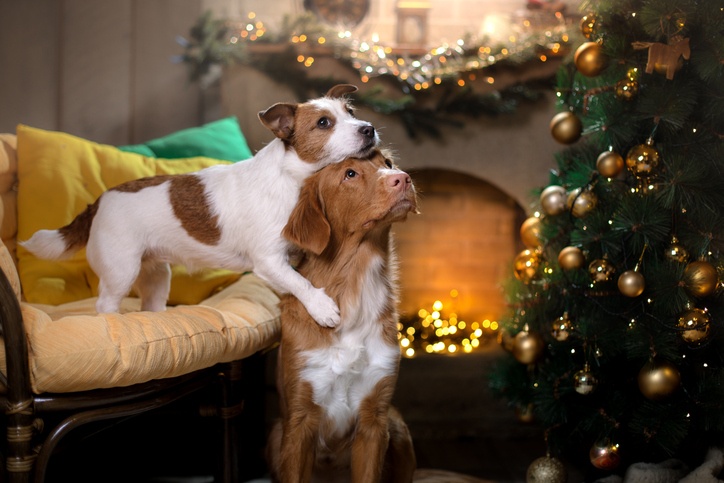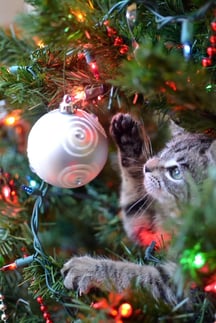 The winter holiday season is a joyous time of year with many people planning to include companion animals in celebrations. To safeguard pawed patients from various seasonal dangers, maintain a positive brand image and increase return visits and revenue, U.S. veterinary offices can promote holiday companion animal safety both in-house and online. The CrossCheck editorial team has selected the following expert advice for reference.
The winter holiday season is a joyous time of year with many people planning to include companion animals in celebrations. To safeguard pawed patients from various seasonal dangers, maintain a positive brand image and increase return visits and revenue, U.S. veterinary offices can promote holiday companion animal safety both in-house and online. The CrossCheck editorial team has selected the following expert advice for reference.
Advanced Preparations
Immediate action during an emergency is crucial. Veterinary offices can equip clients with contact information for the clinic, nearby 24/7 animal hospitals and the ASPCA Poison Control Hotline with flyers, magnets, posters and online posts. Key discussion points include which business to bring companion animals to for varying circumstances, planning a travel route and storing contact numbers in an easily assessable location.
Sweets and Beverages
Appetizers set on low tables and dinner guests who feed companion animals scraps under the table can cause life-threatening conditions such as pancreatitis and stomach bloating. Placing food out of reach, training animals not to beg at the dinner table, and or relocating them to a separate room during parties will prevent the overconsumption of fatty foods. Due to the possibility of intoxication, seizures, and respiratory failure, alcoholic beverages should be securely stored.
Animal-Friendly Décor
 Christmas trees, ornaments, edible decorations, string lights, candles, and other dangerous décor are all too enticing for companion animals. Clients with curious critters can replace glass items with non-breakable decorations and secure all hanging objects such as loose ribbons and lights. Routine inspections of electrical cords and lights can prevent burns.
Christmas trees, ornaments, edible decorations, string lights, candles, and other dangerous décor are all too enticing for companion animals. Clients with curious critters can replace glass items with non-breakable decorations and secure all hanging objects such as loose ribbons and lights. Routine inspections of electrical cords and lights can prevent burns.
For clients with Christmas trees, laying foil around the base to deter cats and leaving the lower section undecorated will help to prevent injuries. If companion animals cannot stay away, relocate the holiday spruce to a separate room or place it on top of tall furniture.
Wagging tails and swatting paws near lit candles can result in serious burns. Animal guardians should keep a watchful eye on companion animals during menorah lighting ceremonies and consider replacing lighted decorations with flameless candles.
To avoid ER visits, position toxic plants including mistletoe, holly, and poinsettias in locations inaccessible to animals.
Appropriate Gifts
Filling Scooter’s stocking with festive toys and treats can provide hours of excitement or trauma. In the office, review appropriate and dangerous toys beginning in October. Resources such as the Humane Society of the United States (HSUS) offer guides on safe dog and cat toys that clients can easily access at home. Gifts intended for both humans and animals can be placed on top of tables instead of under the tree where companion animals can explore.
Fear-Free Fireworks
The unexpected loud booms of fireworks on New Year’s Eve may leave companion animals desperately searching for a place to hide. During this panic, they may run outside, and become lost or injured. To create a safe and relaxing environment, clients can secure animals indoors with the shades drawn and the T.V. or music playing at a low volume. Remaining with companion animals throughout the night will also relieve stress. Veterinarians can demonstrate proper wrapping techniques for DIY anxiety vests using shirts.
.jpg?width=842&height=558&name=iStock-493936564%20(1).jpg)
Year-Round Resources for Veterinary Offices
To maintain a holiday atmosphere that both pawed patients and clients will enjoy, veterinary offices can discuss holiday safety prior to and during the season. In addition, providing guidance on Halloween and home safety can ensure an animal’s well-being throughout the year.
With a selection of payment solutions, CrossCheck assists veterinary offices in business success. Our Multiple Check Service allows businesses to design individualized payment plans for clients in need of extra time to fund veterinary bills without using credit. Clients write 2 – 4 check that are deposited over a 30-day period. CrossCheck guarantees funding of all approved checks at the time of deposit. Veterinary businesses can continue necessary care for pawed patients while receiving compensation and client satisfaction. Learn more by downloading our free guide.



